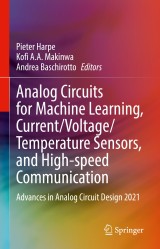Details

Analog Circuits for Machine Learning, Current/Voltage/Temperature Sensors, and High-speed Communication
Advances in Analog Circuit Design 2021|
117,69 € |
|
| Verlag: | Springer |
| Format: | |
| Veröffentl.: | 24.03.2022 |
| ISBN/EAN: | 9783030917418 |
| Sprache: | englisch |
| Anzahl Seiten: | 350 |
Dieses eBook enthält ein Wasserzeichen.
Beschreibungen
This book is based on the 18 tutorials presented during the 29th workshop on Advances in Analog Circuit Design. Expert designers present readers with information about a variety of topics at the frontier of analog circuit design, with specific contributions focusing on analog circuits for machine learning, current/voltage/temperature sensors, and high-speed communication via wireless, wireline, or optical links. This book serves as a valuable reference to the state-of-the-art, for anyone involved in analog circuit research and development.
<div>Part I: Introduction.- Chapter 1:Mixed-signal compute and memory fabrics for deep neural networks.- Chapter 2 :Analog computation with RRAM and supporting circuits.- Chapter 3: Analog in-Memory Computing with SOT-MRAM: Architecture and Circuit Challenges.- Chapter 4: Prospects for analog circuits in deep networks.- Chapter 5: SPIRIT: A first mixed-signal SNN using co-integrated CMOS neurons and resistive synapses.- Chapter 6: Accelerated analog neuromorphic computing.- Part II: Introduction.- Chapter 7: Advancements in current sensing for future automotive applications.- Chapter 8: Next generation current sense interfaces for the IoT era.- Chapter 9: Precision voltage sensing in deep sub-micron and its challenges.- Chapter 10: Breaking unusual barriers in sensor interfaces: from minimum energy to ultimate low-cost.- Chapter 11: Thermal sensor and reference circuits based on a time-controlled bias of pn-junctions in FinFET technology.- Chapter 12: Resistor-based temperature sensors.- Part III: Introduction.- Chapter 13: Recent advances in fractional-N frequency synthesis.- Chapter 14: ADC/DSP-based receivers for high-speed serial links.- Chapter 15: ADC based SerDes receiver for 112 Gb/s PAM4 wireline communication.- Chapter 16: BiCMOS integrated circuits for millimeter-wave wireless backhaul transmitters.- Chapter 17: Optical communication in CMOS - Bringing new opportunities to an established platform.- Chapter 18: Coherent silicon photonic links.- Index.</div>
<p><b>Pieter Harpe</b> received the M.Sc. and Ph.D. degrees from the Eindhoven University of Technology, The Netherlands, in 2004 and 2010, respectively. In 2008, he became a researcher at Holst Centre / imec, The Netherlands. Since then, he has been working on ultra low-power wireless transceivers, with a main focus on ADC research and design. In April 2011, he joined Eindhoven University of Technology where he is currently an Associate Professor on low-power mixed-signal circuits. Dr. Harpe is co-organizer of the yearly workshop on Advances in Analog Circuit Design (AACD) and analog subcommittee chair for the ESSCIRC conference. He also served as ISSCC ITPC member, IEEE SSCS Distinguished Lecturer, and guest editor of the IEEE Journal of Solid-State Circuits. He is a Senior Member of the IEEE and recipient of the ISSCC 2015 Distinguished Technical Paper Award.</p><b>Kofi Makinwa</b> holds degrees from Obafemi Awolowo University, Ile-Ife (B.Sc., M.Sc.), Philips International Institute, Eindhoven (M.E.E.), and Delft University of Technology, Delft (Ph.D.). From 1989 to 1999, he was a research scientist at Philips Research Laboratories, where he designed sensor systems for interactive displays, and analog front-ends for optical and magnetic recording systems. In 1999 he joined Delft University of Technology, where he is currently an Antoni van Leeuwenhoek Professor of the Faculty of Electrical Engineering, Mathematics and Computer Engineering and Chair of the Electronic Instrumentation Laboratory. Dr. Makinwa holds 18 patents, and has authored or co-authored 4 books and over 170 technical papers. He is on the program committee of the European Solid-State Circuits Conference (ESSCIRC) and the workshop on Advances in Analog Circuit Design (AACD). He has also served on the program committees of the International Solid-State Circuits Conference (ISSCC), the International Conference on Solid-State Sensors, Actuators and Microsystems (Transducers) and the IEEE SensorsConference. He was a distinguished lecturer of the IEEE Solid-State Circuits Society (2008 to 2011) and a guest editor of the Journal of Solid-State Circuits (JSSC). He has given invited talks and tutorials at several international conferences including ISSCC, ESSCIRC, ASSCC and the VLSI symposium. At the 60th anniversary of ISSCC, he was recognized as one of its top ten contributing authors. For his Ph.D. research, Dr. Makinwa was awarded the title of 'Simon Stevin Gezel' by the Dutch Technology Foundation (STW). In 2005, he received a VENI grant from the Dutch Scientific Foundation (NWO). He is a co-recipient of several best paper awards: from the JSSC (2), ISSCC (4), ESSCIRC (2) and Transducers (1). He is an IEEE Fellow, an alumnus of the Young Academy of the Royal Netherlands Academy of Arts and Sciences (KNAW) and an elected member of the AdCom of the IEEE Solid-State Circuits Society.<p></p><p><b>Andrea Baschirotto</b> graduated in Electronic Engineering (summa cum laude) from the University of Pavia in 1989. In 1994, he received the Ph.D. degree in electronics engineering from the University of Pavia. In 1994, he joined the Department of Electronics, University of Pavia, as a Researcher (Assistant Professor). In 1998, he joined the Department of Innovation Engineering, University of Lecce, Italy, as an Associate Professor. In 2007, he joined the Department of Physics, University of Milan-Bicocca, Italy, as an Associate Professor.</p><p></p><p></p>
This book is based on the 18 tutorials presented during the 29th workshop on Advances in Analog Circuit Design. Expert designers present readers with information about a variety of topics at the frontier of analog circuit design, with specific contributions focusing on analog circuits for machine learning, current/voltage/temperature sensors, and high-speed communication via wireless, wireline, or optical links. This book serves as a valuable reference to the state-of-the-art, for anyone involved in analog circuit research and development.<div><br><div><ul><li>Provides a state-of-the-art reference in analog circuit design, written by experts from industry and academia;</li><li>Presents material in a tutorial-based format;</li><li>Includes coverage of analog circuits for machine learning, current/voltage/temperature sensors, and high-speed communication.</li></ul></div></div>
Provides a state-of-the-art reference in analog circuit design, written by experts from industry and academia Presents material in a tutorial-based format Includes coverage of high-performance analog-to-digital and digital to analog converters, Smart Sensors for the IoT, and Sub-1V & Advanced-node Analog Circuit Design


















